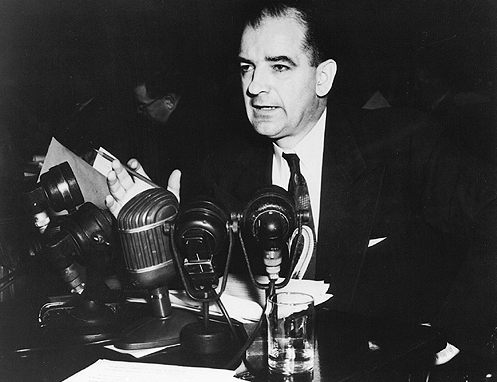The U.S. Government Needs McCarthy Level Inquiries Into The Rising State Of Fascism In America
Source: GettyImages
The McCarthy Era and Historical Context
In recent years, there has been a noticeable escalation in concerns regarding the ascent of fascist ideologies within the United States. The prevailing socio-political landscape has ignited widespread discussions, prompting a reevaluation of the necessity for a comprehensive examination—drawing parallels to the thorough inquiries characteristic of the McCarthy era.
The purpose of such an investigation would be to gain a nuanced understanding and effectively address the escalating influence of fascist ideologies within the nation. This article delves into the underlying reasons propelling the call for these investigations and considers the potential implications for American society.
The mention of McCarthy-era inquiries invokes a historical period in the 1950s when Senator Joseph McCarthy spearheaded investigations aimed at exposing individuals and organizations believed to be associated with or sympathetic to communism. Despite the controversial nature of the methods employed and the outcomes achieved, the intensity of these inquiries served to underscore the perceived threat to national security.
The historical context of the McCarthy era provides a backdrop against which contemporary concerns about fascist ideologies in the United States are measured, emphasizing the gravity of the situation and the perceived need for a meticulous examination in the interests of safeguarding the nation's well-being.
This analysis was performed by the Manifesto Project Database which is funded by the Social Science Research Center Berlin.
The Resurgence of Fascist Ideologies
Analogous to the concerns of communism during McCarthyism, today's discussions focus on the resurgence of fascist ideologies in America. Various factors contribute to this rising concern, including the amplification of extremist views on social media, the increasing visibility of far-right groups, and the polarization of political discourse.
In a 2022 publication, political scientist Anthony DiMaggio emphasizes the necessity of making discussions about combating fascism a common occurrence in households, educational institutions, and other settings.
“This extremism has been building for decades with rightwing media pundits’ embrace of increasingly conspiratorial, authoritarian, racist and xenophobic messages, which has gone unacknowledged for the most part in mainstream political and academic discourse.” ANTHONY DIMAGGIO
DiMaggio’s book emphasis that to dismantle the threat of fascist politics in the U.S., the people must emerge from denial that it has taken root. Fighting fascism must become a regular topic of conversation in homes, schools, media and everywhere else discussions about the future of the nation take place.
Threats to Democracy
Proponents of McCarthy-level inquiries argue that the current state of fascism poses a significant threat to the democratic principles upon which the United States was founded. They point to instances of violence, hate speech, and attempts to undermine democratic institutions as evidence of the urgent need for a comprehensive investigation.
Just as McCarthy-era inquiries were framed as essential for protecting national security against the perceived threat of communism, advocates for investigations into fascism argue that the government must act decisively to safeguard the nation against internal threats. They contend that identifying and addressing the roots of fascist ideologies is crucial for maintaining a stable and secure society.
Source: Squarespace/Unsplash
Balancing Civil Liberties
Critics express strong reservations about embracing tactics reminiscent of the McCarthy era, underscoring the critical need to safeguard civil liberties and prevent the emergence of detrimental witch hunts. Their contention is rooted in the belief that any investigative process should adhere to principles of transparency, meticulously respecting the rights of both individuals and organizations.
Nevertheless, amidst the careful consideration of civil liberties, when the sanctity of the nation's democracy is under scrutiny, a comprehensive toolkit should be at the disposal of those tasked with conducting inquiries. This perspective maintains that, in the face of potential malicious actors seeking to undermine the democratic fabric, the utilization of a full spectrum of investigative tools becomes imperative. The contention is that restricting the available means of inquiry could inadvertently hinder efforts to uncover and address the roots of fascist ideologies, thereby compromising the very democracy these investigations aim to protect.
In essence, the debate hinges on striking a delicate balance between the imperative to protect civil liberties and the recognition that, in times of perceived threats to the democratic order, a judicious use of investigative tools becomes essential to safeguard the principles upon which the United States was founded. The challenge lies in navigating this fine line to ensure the integrity of inquiries while upholding the democratic values that form the bedrock of the nation.
A Modern Approach
In the 21st century, the call for McCarthy-level inquiries does not necessarily imply replicating the methods of the past. Instead, proponents suggest adapting the concept to modern challenges, employing rigorous investigative processes, and leveraging technology to uncover the extent of fascist influence.
The rising concern about fascism in America has prompted some to advocate for McCarthy-level inquiries as a means to understand and address the threat to democracy and national security. The debate surrounding the necessity of such investigations highlights the delicate balance between protecting the nation and upholding individual freedoms. As discussions continue, it remains to be seen whether the U.S. government will embark on a comprehensive examination of the growing state of fascism in the country.


